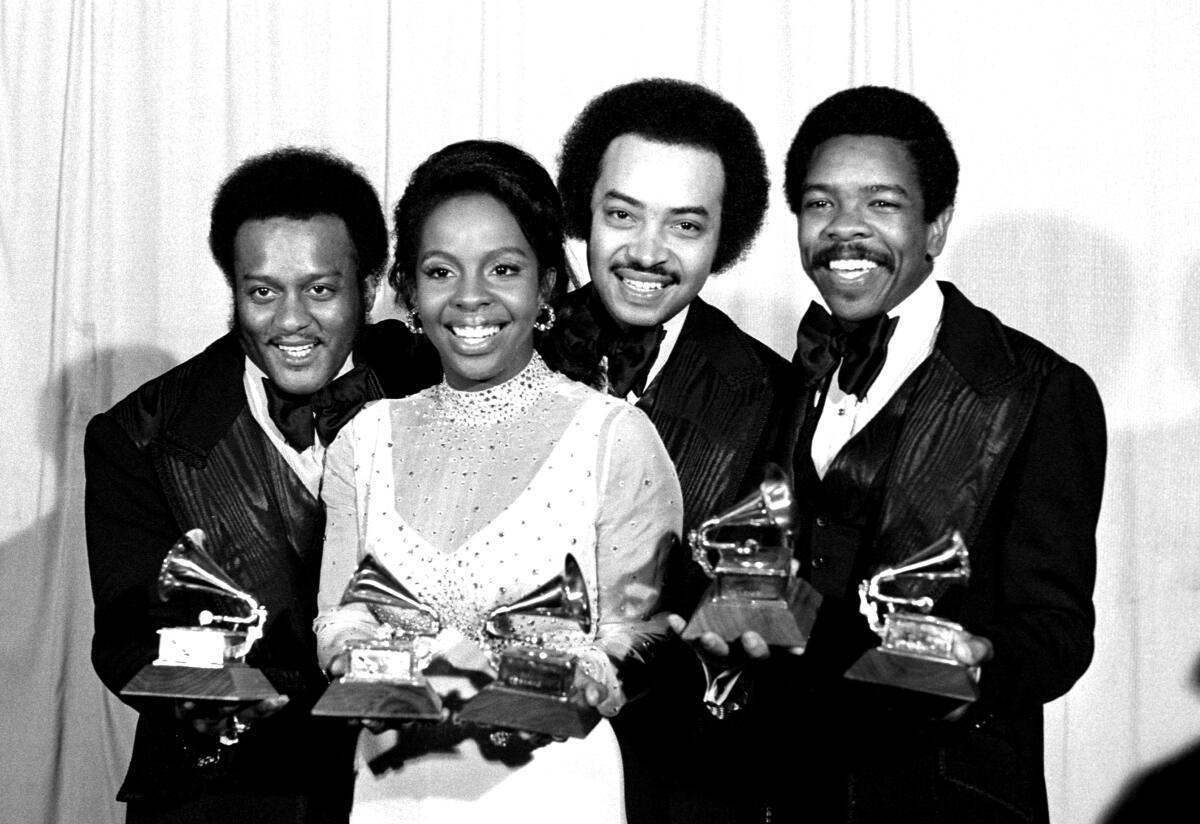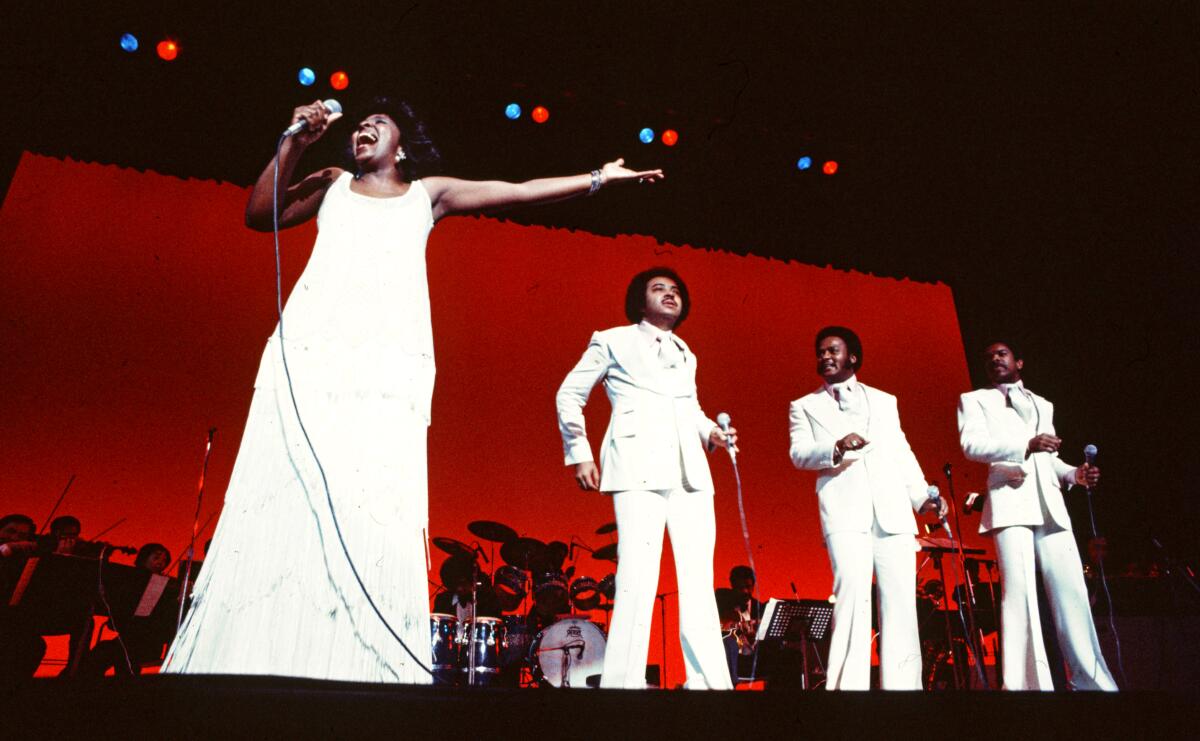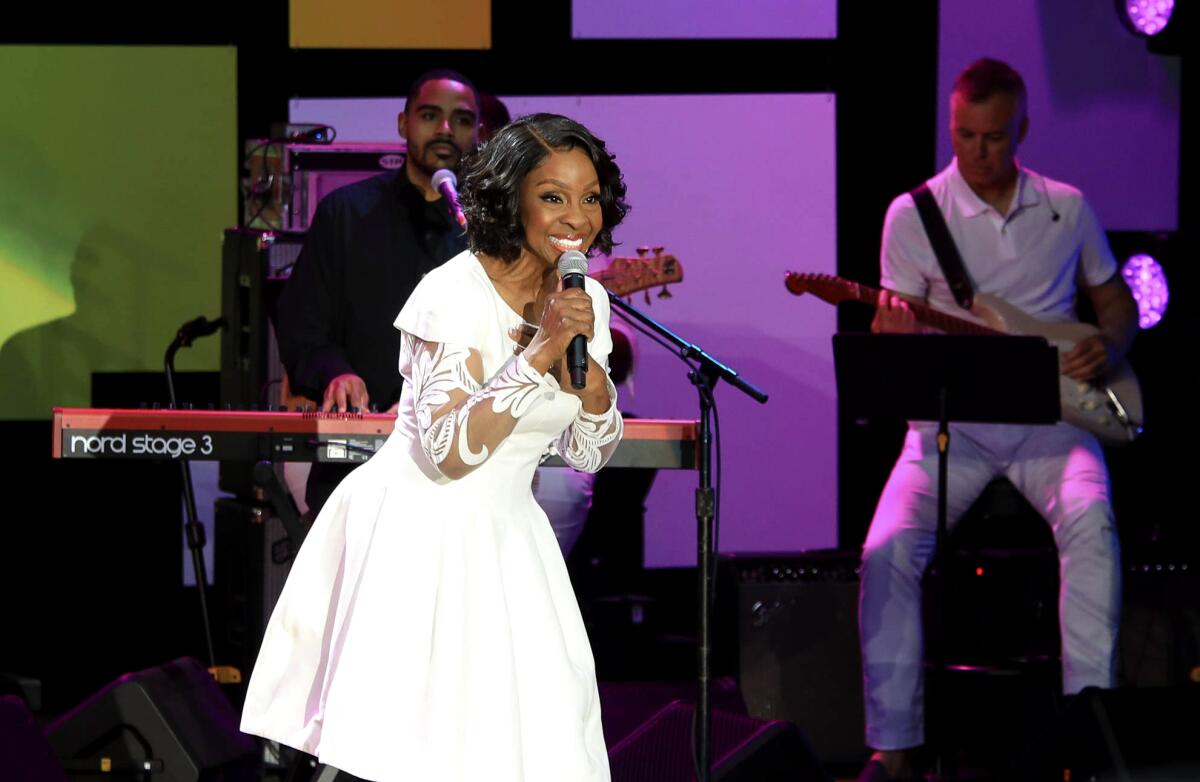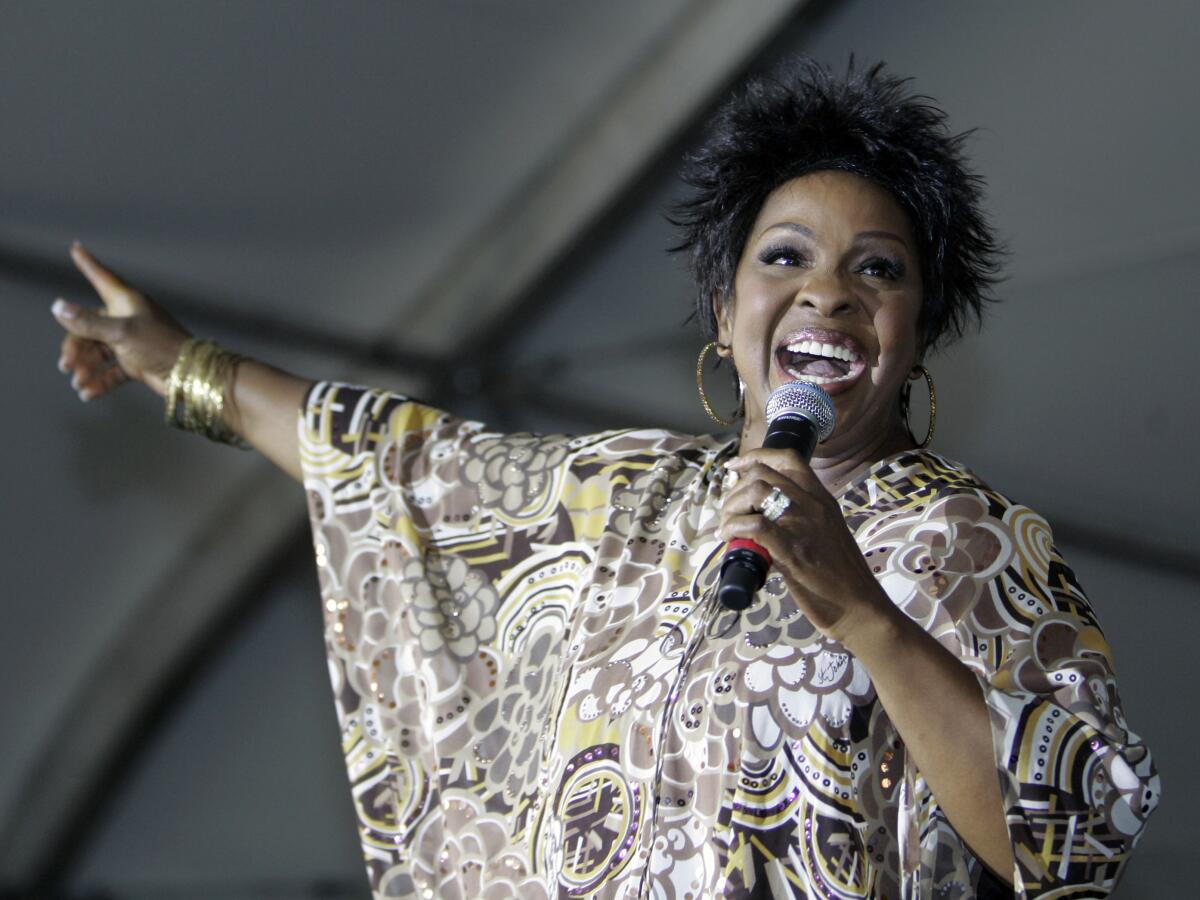Why Gladys Knight and the Pips’ ‘Midnight Train to Georgia’ is still the perfect pop song

This essay is adapted from Danyel Smith’s new book, “Shine Bright: A Very Personal History of Black Women in Pop.”
My questions have never changed. Been asking since L.A. was new to me. Since my first eighty-degree Christmas. Since my first paychecks from the ’hood pool where I swabbed concrete with chlorine.
Why does Gladys Knight have to go back to Georgia if she’s doing okay in Los Angeles? He’s the one, after all, who pawned all his hopes. Why are the Pips so certain of Knight’s decision to climb aboard Amtrak? They nearly step on her mournful I’ll be with him with their unified I know you will. My questions have never changed.
The 1973 song, a huge R&B hit and the group’s only No. 1 pop single, is the stunning and succinct story of a woman torn. One of the most forlorn and perfect songs ever recorded, “Midnight Train to Georgia” is my favorite song of all time.
Why? Because though Knight is forthright — I got to go / I got to go — about leaving, she also sounds like she’s convincing herself. Even when I was a kid, Gladys Knight sounded to me like she was singing one thing and wanting another. In my mind, she gets him to the station, but when the train pulls off, Knight is still on the platform.

Even in her glowing, tiny-waisted, full-throated prime, Gladys Knight was underrated. She is often under-appreciated even now. Part of this is because she came of age in the shadow of Diana Ross, whose anime eyes had seduced the world. But it is equally because though she has sold millions of records, toured globally, been nominated by her peers for 22 Grammys and won 7, and was inducted in 1996 into the Rock & Roll Hall of Fame — Gladys is almost always a part of a group or collaboration.
One of the most transcendent pop records of all time, 1985’s “That’s What Friends Are For,” stars Dionne Warwick, and features Stevie Wonder (on harmonica as well as vocals) and Elton John. But it’s Knight who rolls into its last third, infused with the holiness of giving back (the song raised near $2 million for AIDS research) and the convergence of talent by which she is surrounded. The earnest emotional surge of Knight’s voice and body language give John permission to get grimy. In the video he looks as if he might come out from under that bolero.
Knight did the same for the Pips — led by example. Of the many Black R&B pop groups to come out of the Motown era — the Supremes, the Shirelles, the Temptations, Smokey Robinson and the Miracles, the Four Tops, the Stylistics, Martha and the Vandellas, the Marvelettes, the Isley Brothers, the Drifters, the Jackson 5 and the O’Jays among them — Gladys Knight, along with Ruby Nash of Ruby and the Romantics, are the only Black women lead singers with an all-male vocal backup.

The energy around Gladys Knight & the Pips is radical. Electric. It’s like an all-boys treehouse is infiltrated and a brilliant girl emerges as its charismatic leader. Gladys Knight and her Pips’ chemistry is powerful in part because, within the harmonies, there is tension. It contributes to the kind of wildly earnest vocal conversation that makes 1970’s “If I Were Your Woman” emerge from swarms of Motown slow jams as a royal offering.
The singularity of her leadership did not go uncommented upon by the all-male writers’ room of Richard Pryor’s 1977 “The Richard Pryor Special?” (NBC). There’s a skit featuring comedian Shirley Hemphill. Her character suggests to a tuxedoed Pryor that he should host her favorite group — “the Pips” — on his show. “I didn’t,” Hemphill’s character reminds, “say nothing about no Gladys.” Pryor wonders how Gladys might feel about that. He’s told that Gladys can take care of herself. Cut to an announcer saying that “The Richard Pryor Show” is proud to present “& the Pips.”

The funny is in the ampersand, right? In the precision with which Knight is clipped. The real Bubba, William and Edward, in high spirits, go into a couple of GK&TP songs, beautifully doing absolutely only their background vocals. One camera breaks wide to capture costumes and choreography, and another focuses closely on what would be Gladys — a standing microphone. The joke is on who? The woman who led her crew into immortality?
The fact is, Knight makes songs bigger. Take, for example, her 1974 live recording of “The Way We Were/Try to Remember,” when she remakes Barbra Streisand’s Academy Award–winning version. Why don’t we try to remember / That kind of September / When life was sloooooow: So goes Knight’s introduction, elocuted with Sunday-grace pacing. And then, blues: Come to think about it / As bad as we think they are / These will become the good old days of our children. She goes on to convey the complexity of “the way” so many Black people in America “were” forced to be, and our complex relationship with the past. On her way — unofficially by herself — to a No. 3 pop hit, Gladys Knight sings out all that misty dissonance. Can it be that it was all so simple then? No. Knight sings about Black people in the scattered pictures of American history. Her dismay is mistaken for and embraced by the masses as Black joy.

It was the late 1960s, and songwriter Jim Weatherly, known for penning great country records, was on the phone with pre–”Charlie’s Angels” Farrah Fawcett. Fawcett was married to Lee Majors, who was on a flag football team with Weatherly. This was about five years before he became the TV astronaut Steve Austin, when Majors was starring as moody Heath Barkley on “The Big Valley.” Fawcett told Weatherly that Majors wasn’t in. This conversation is the origin of Gladys Knight & the Pips’ definitive song. What was Farrah doing? Packing to visit her parents, she said. About to get on a midnight plane to Houston.
Weatherly says he jumped off the phone and wrote the music and lyrics to “Midnight Plane to Houston” in about 45 minutes. Then, he said in 2013, “I filed away the song.” Two years later, he sent a recorded version to Cissy Houston. Cissy recorded Weatherly’s song but changed “plane” to “train.” The destination was changed, by Houston, to “Georgia,” and Cissy says she recorded the song with “a country-gospel thing going.” But there was no buzz on it. Weatherly then sent the song to Gladys and the Pips. They’d already recorded his “Neither One of Us (Wants to Be the First to Say Goodbye),” to much success. According to Weatherly, Neil Bogart called in producer Tony Camillo to record and arrange. Camillo looked to Ed Stasium to mix and engineer “Midnight Train.” Stasium was 22, and his tastes back then ran to Sinatra, Ella, Basie, Bing Crosby and Nat Cole. “I didn’t know what I was doing... But I had an idea,” he says.
While “Midnight Train to Georgia” functions as a conversation between Knight and the Pips, for Knight, it was tied up in her real life. She and her first husband, Jimmy Newman, didn’t formally divorce until 1973. And while she married three other men, in her 1997 memoir, “Between Each Line of Pain and Glory,” she calls Newman the love of her life. “I was thinking about my own situation,” Knight said in 2013. “My husband at the time was a beautiful saxophonist, and so gifted. But he was unhappy that we didn’t have a more traditional marriage, because I was often on the road, or recording. Ultimately it all proved too much for him, like the song said. ... I was going through the exact same thing that I was singing about when recording — which is probably why it sounds so personal.”

The kernel of my love for “Midnight Train to Georgia” is its actual setting, which is not Georgia.
Gladys: Mmmmm / L.A. / Proved too much for the man.
Pips: Too much for the man / He couldn’t make it.
I know that Los Angeles. In the 1970s, I lived on its outskirts.
Stars like Diahann Carroll lived in Los Angeles. Redd Foxx, too. Marvin Gaye and Diana Ross and what felt like all of Motown had moved to L.A. The son of Texas sharecroppers and UCLA classmate of Jackie Robinson, Tom Bradley was rallying a multiracial coalition to become the first Black mayor of a big American city with a majority-white population.
Black folks migrated to the City of Angels for creative freedom, and for plain old freedom. They moved to L.A. streets with optimistic names like Hi Point after a bad time elsewhere. They came to make music and politics and movies and money and to be front and center in the American machine. Or to just send their kids to good public schools. And trim hedges in whatever shape they chose. Play music loud in their Monte Carlos, holding back the tears, relieved they’re not in the places left behind.
Danyel Smith is the host of the Spotify Original show “Black Girl Songbook” and author of “Shine Bright: A Very Personal History of Black Women in Pop.”
Copyright © 2022 by Danyel Smith. Published by Roc Lit 101, a joint venture between Roc Nation LLC and One World, an imprint of Random House, a division of Penguin Random House LLC.
More to Read
The biggest entertainment stories
Get our big stories about Hollywood, film, television, music, arts, culture and more right in your inbox as soon as they publish.
You may occasionally receive promotional content from the Los Angeles Times.










